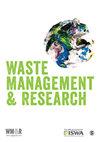确定可持续废物管理热值建模未来方向的小型综述
IF 3.7
4区 环境科学与生态学
Q3 ENGINEERING, ENVIRONMENTAL
引用次数: 0
摘要
全球估算表明,城市固体废物(MSW)中的能源含量未得到充分利用,从而影响了减少化石二氧化碳排放的努力,并错失了在能源消耗中追求循环经济的机会。以热值(HVs)表示的城市固体废物的能量含量,是决定是否适合焚烧废物获取能源和管理废物流的主要因素。文献揭示了传统统计热值建模方法的局限性,这些方法假定城市固体废物样本的理化特性与其热值之间存在线性和相加关系,并忽略了城市固体废物混合物中的不可燃物质对能量收集的影响。基于人工智能(AI)的模型前景广阔,但在基于既有燃烧理论的解释方面也存在挑战。从变量选择的角度来看,将城市固体废物的物理成分类别作为解释变量会忽视类别内能量含量的变化,而应用环境或社会经济因素则可解决随着社会发展而出现的废物成分变化问题。这篇文章向专业人士和建模人员表明,利用人工智能技术并结合社会和环境因素,是在废物管理中推进高电压预测的重要方向。这些方法有望为焚烧废物获取能源和加强可持续废物管理实践提供更精确的评估。本文章由计算机程序翻译,如有差异,请以英文原文为准。
A mini-review for identifying future directions in modelling heating values for sustainable waste management
Global estimations suggest energy content within municipal solid waste (MSW) is underutilized, compromising efforts to reduce fossil CO2 emissions and missing the opportunities for pursuing circular economy in energy consumption. The energy content of the MSW, represented by heating values (HVs), is a major determinant for the suitability of incinerating the waste for energy and managing waste flows. Literature reveals limitations in traditional statistical HV modelling approaches, which assume a linear and additive relationship between physiochemical properties of MSW samples and their HVs, as well as overlook the impact of non-combustible substances in MSW mixtures on energy harvest. Artificial intelligence (AI)-based models show promise but pose challenges in interpretation based on established combustion theories. From the variable selection perspectives, using MSW physical composition categories as explanatory variables neglects intra-category variations in energy contents while applying environmental or socio-economic factors emerges to address waste composition changes as society develops. The article contributes by showing to professionals and modellers that leveraging AI technology and incorporating societal and environmental factors are meaningful directions for advancing HV prediction in waste management. These approaches promise more precise evaluations of incinerating waste for energy and enhancing sustainable waste management practices.
求助全文
通过发布文献求助,成功后即可免费获取论文全文。
去求助
来源期刊

Waste Management & Research
环境科学-工程:环境
CiteScore
8.50
自引率
7.70%
发文量
232
审稿时长
4.1 months
期刊介绍:
Waste Management & Research (WM&R) publishes peer-reviewed articles relating to both the theory and practice of waste management and research. Published on behalf of the International Solid Waste Association (ISWA) topics include: wastes (focus on solids), processes and technologies, management systems and tools, and policy and regulatory frameworks, sustainable waste management designs, operations, policies or practices.
 求助内容:
求助内容: 应助结果提醒方式:
应助结果提醒方式:


